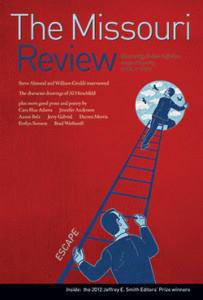 Last night, I drew a charcoal picture of what I meant to be my parents’ golden retriever, Buddy (with two eyes), before next Thursday, when a cancerous mass will be removed from his skull, along with one of his eyes.
Last night, I drew a charcoal picture of what I meant to be my parents’ golden retriever, Buddy (with two eyes), before next Thursday, when a cancerous mass will be removed from his skull, along with one of his eyes.
I’ve just graduated with my MFA in fiction, and am writing a short story about a pedophile bicyclist, but was, after reading Adam Gopnik’s “Life Studies” early on at Goddard, compelled to buy a $5 charcoal set from a close-out store and since, have been drawing pictures that resemble animals and people, but in actuality, all feel like drafts of a story without a true epiphany, without heart or breath. I post these to Facebook and send them in text messages to my best friend because they feel like immediate gratification, as though in one glimpse, someone can see what clearly is a dog. Although perhaps too unpolished to illustrate the sadness Buddy can’t know exists when two eyes become one eye. Soon, he will see the world one-half at a time. The drawing was in-progress, in much the same way my fiction was, a father struggling to realize his fears for his son, who’s way closer in proximity to a pedophile than he’s comfortable with.
I talked through this charcoal drawing of Buddy last night while sitting next to my husband, Cory, who watched the sequel of “Taken,” a movie I couldn’t watch because I didn’t find it believable. How could members of one family be stolen two times? I asked him.
How do I know? Cory said.
It’s hard to draw something you know personally, I said. I can mess up a squirrel, or impose my own ideas of my mother’s face in a portrait of her from the 60s (because it’s not how I know her today), but Buddy’s nose, the fattest most bulbous blackest nose I’ve ever seen on a dog has to look both natural and true-to-Buddy-as-he-is-tonight and believable. I spent most of the two hours I drew Buddy just trying to get the shadows on Buddy’s face accurate enough to craft his nose as horrifying and endearing and entirely normal.
In 2008, my parents lost their first golden retriever, also named Buddy, suddenly, because of a mass that put pressure on his heart. And now, this Buddy, too, has a mass. My father and I chatted briefly on the phone last night, discussing how unfair and unbelievable it was that both Buddies could have such a fate. But life, it turns out, is not about what’s believable, though we hold art to a standard of making life somehow believable and sensible and controlled. Workshops discuss sequence and plot and structure as though life relies on this instinct–and perhaps because it doesn’t. Maybe it’s controlling fear that makes art worth the hours and thousands of dollars we spend on it.
Cory looked over and commented on the shadow and angles cast on Buddy. How his ear didn’t have the shading it should and how it didn’t follow his snout entirely.
Why is everything about angles and math? I asked.
He was right, and slowly, I erased the charcoal enough so that I could recognize Buddy in the drawing, and I said, Hi, Buddy, when his nose looked about right. I guess it’s really all about light and dark, I said, trying to oust math from the art. This morning, while continuing the pedophile story, the father materialized, petrified for his son, and at the same time damaged by his own experience with a pedophile, all while realizing that souls are souls and bodies are bodies. I hope, in the final draft, he captures how simple math and unbelievable life have the potential to wreck us.






 When your husband shows you the house, recently re-listed on Zillow, complain that he’s been cheating on your
When your husband shows you the house, recently re-listed on Zillow, complain that he’s been cheating on your 


